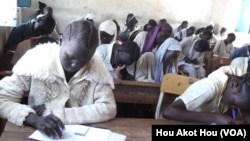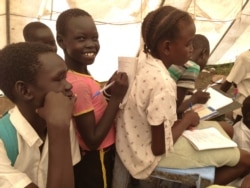Two United Nations agencies are calling on South Sudanese authorities to immediately reopen schools across the country, saying the damage being done to children forced to stay home outweighs the risk of catching the novel coronavirus.
In a joint editorial released on Tuesday, children’s agency UNICEF and UNESCO (United Nations Educational, Scientific and Cultural Organization) argued that while it is important to protect children from COVID-19, children and schools are not the main drivers of the epidemic. COVID-19 is the disease brought on by the coronavirus.
An estimated 2.2 million South Sudanese children are not attending school, and the longer schools stay closed, the less likely it is that children will return to the classroom, according to Tap Raj Pant, UNESCO’s education chief in South Sudan.
“If the schools are not reopened timely, there is a big risk of not having enrolled children again back to school, which will increase the number of out-of-school children in South Sudan,” Pant told VOA’s South Sudan in Focus program.
Research indicates children are less likely to contract the coronavirus than adults, and less likely to become seriously ill, although they are capable of passing the infection to older people.
Dr. Mohamed Ayoya, UNICEF’s representative in South Sudan, said that if South Sudanese children are kept out of school for long periods of time, their lives are more likely to be tarnished by poverty and violence.
“We have seen this during the Ebola time in West Africa, that their exposure to physical, emotional, and sexual violence increases, their mental health deteriorates and they become more vulnerable to child labor and they are less likely to break out of the cycle of poverty,” Dr. Ayoya told VOA.
Even more worrisome, said Ayoya, is that girls who stay away from school for long periods of time often never return.
Most projects aimed at helping strengthen the country’s educational system have been put on hold since schools were closed due to COVID-19 in March.
Vulnerable children, especially those in rural areas, depend on school feeding programs to have daily meals, which means more children in South Sudan will be malnourished, said Ayoya.
“We have no other interest in South Sudan other than the interest of children, so reopening the schools is for the interest of the children and to make sure that tomorrow’s leaders of South Sudan are actually being provided with opportunity to train, to take forward the leadership of this country,” Ayoya told VOA.
No one knows when the virus will be under control and children can safely return to school, said Health Ministry spokesman Dr. Thuoi Loi.
“It is not yet a decision but there is a technical team actually comprised of the ministries of health and higher education to keep monitoring the trend of infection in the country, and at the same time see what can be done to resume with classes within the context of COVID-19 and adhering to the preventive measures,” Dr. Loi told South Sudan in Focus.
While school is out, Juba parent Philip Lokudu said many children in his Gudele neighborhood have turned to illegal activities like joining outlawed groups that attack each other with machetes and knives.
“I am seeing a lot of students really getting a lot of difficulties in staying at home and they are joining other groups which might turn them away from school. So, opening the schools will be of an advantage to both the students and the teachers because it will keep them busy,” Lokudu told VOA.








